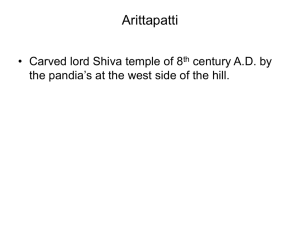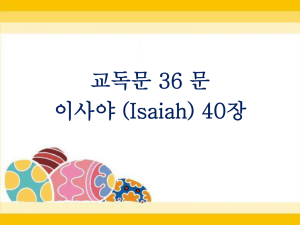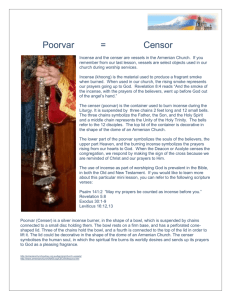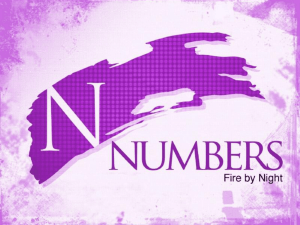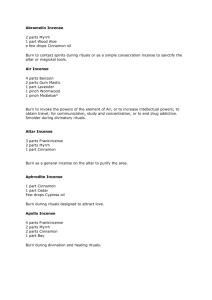rather continuing
advertisement
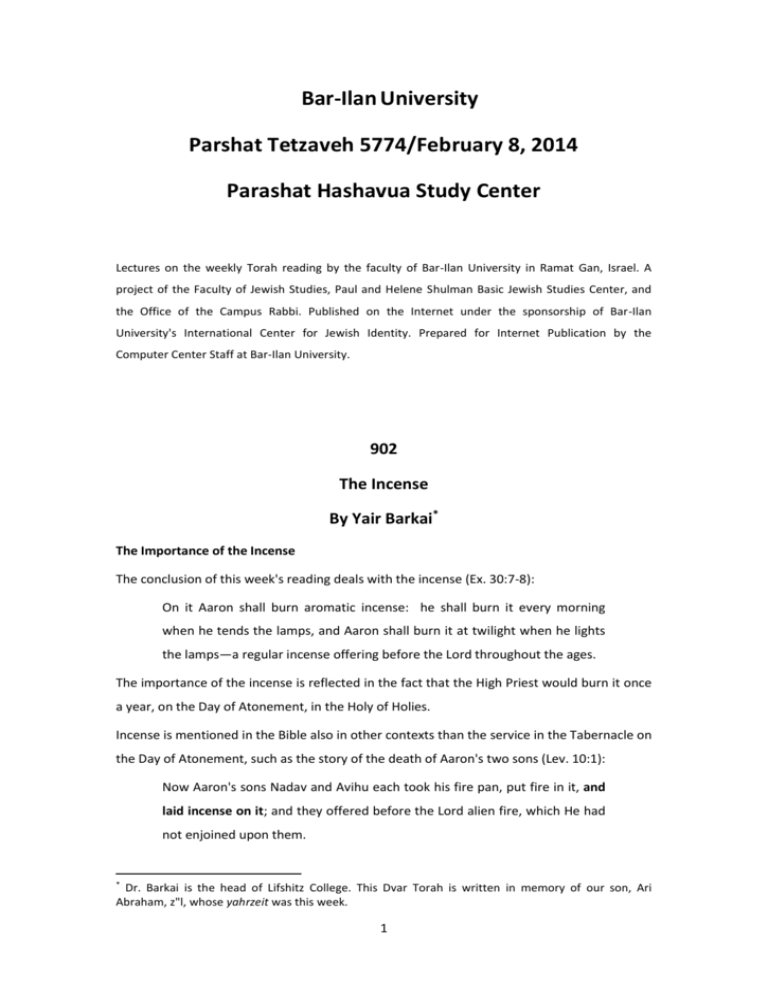
Bar-Ilan University Parshat Tetzaveh 5774/February 8, 2014 Parashat Hashavua Study Center Lectures on the weekly Torah reading by the faculty of Bar-Ilan University in Ramat Gan, Israel. A project of the Faculty of Jewish Studies, Paul and Helene Shulman Basic Jewish Studies Center, and the Office of the Campus Rabbi. Published on the Internet under the sponsorship of Bar-Ilan University's International Center for Jewish Identity. Prepared for Internet Publication by the Computer Center Staff at Bar-Ilan University. 902 The Incense By Yair Barkai* The Importance of the Incense The conclusion of this week's reading deals with the incense (Ex. 30:7-8): On it Aaron shall burn aromatic incense: he shall burn it every morning when he tends the lamps, and Aaron shall burn it at twilight when he lights the lamps—a regular incense offering before the Lord throughout the ages. The importance of the incense is reflected in the fact that the High Priest would burn it once a year, on the Day of Atonement, in the Holy of Holies. Incense is mentioned in the Bible also in other contexts than the service in the Tabernacle on the Day of Atonement, such as the story of the death of Aaron's two sons (Lev. 10:1): Now Aaron's sons Nadav and Avihu each took his fire pan, put fire in it, and laid incense on it; and they offered before the Lord alien fire, which He had not enjoined upon them. * Dr. Barkai is the head of Lifshitz College. This Dvar Torah is written in memory of our son, Ari Abraham, z"l, whose yahrzeit was this week. 1 One of the explanations of the death of Aaron's two sons appears in Leviticus Rabbah (Margaliyot ed.), chapter 20: Then He said to Moses: "Come up to the Lord, with Aaron, Nadav and Avihu" (Ex. 24:1). This teaches us that Moses and Aaron went first, Nadav and Avihu walked behind them, and all Israel followed, and Nadav and Avihu were saying: 'When will these two old men die and we assume authority over the community?'…A further proof [of their guilt] is from the following: Yet He did not raise His hand against the leaders of the Israelites (Ex. 24:11). From this, said Rabbi Pinchas, it may be inferred that they deserved to have a hand laid on them. For Rabbi Joshua said: Did provisions go up with them to Sinai, that you should be able to say: they beheld G-d, and they ate and drank (loc. cit.)? No, but it teaches you that they fed their eyes upon the Shekhinah, as a man looks upon his neighbor while eating and drinking. So we see that they died for behaving haughtily both towards the Shekhinah, not hiding their faces from the sight of the Divine Presence but rather continuing to feast their eyes on it as one does on food and drink, and towards Moses and Aaron, looking forward to their death in order to take their place as the leaders of the people. In the uprising of Korah and his followers (Num. ch. 16), incense was used for the "trial" of Moses and Aaron versus Korah and his followers, as they were commanded (Lev. 16:17): "Each of you take his fire pan and lay incense on it, and each of you bring his fire pan before the Lord, two hundred and fifty fire pans; you and Aaron also [bring] your fire pans." Hubris motivated Korah and his men to rebel against Moses and Aaron, as Rabbi Samson Raphael Hirsch comments on the verse at hand: "This hints at their stiff-necked nature and arrogance in acting as they did." The incense, that brought upon the sinful community that burned it their severe punishment, was also used to allay the Lord's wrath (Num. 17:11-12): Then Moses said to Aaron, "Take the fire pan, and put on it fire from the altar. Add incense and take it quickly to the community and make expiation for them. For wrath has gone forth from the Lord: the plague has begun!"…He put on the incense and made expiation for the people. We even read of King Uzziah (II Chron. 26:16): "When he was strong, he grew so arrogant he acted corruptly: he trespassed against his G-d by entering the Temple of the Lord to offer incense on the incense altar." Uzziah, a righteous king, must have thought (as Rashi suggests) that "it is fitting for a king to serve the King of Glory"; he, too, committed the same sin as Aaron's sons, thinking that the sacred service allows for spontaneity at the discretion 2 of the individual and is not necessarily subordinate to the dictates of the Torah. Insofar as the verse attests to Uzziah's motive, we know he was led to act corruptly against the Lord because of arrogance, just as with Korah and his followers. Of importance to the matter at hand is that of all the rituals performed in the Temple, Uzziah chose to express his religious emotions specifically through offering incense on the golden incense altar. This choice attests to the importance of the incense in his eyes. Preparing the Incense Even though the aromatic ingredients of the incense are listed further on in the chapter (30:34)—"And the Lord said to Moses: Take the herbs stacte, onycha, and galbanum—these herbs together with pure frankincense; let there be an equal part of each"—during the Second Temple period, its method of preparation was a mysterious secret guarded by the family of Avtinas, as we learn from the Mishnah (Yoma 3.11): These were mentioned to their shame: they of the house of Garmu would not teach anything about the preparation of the showbread; they of the house of Avtinas would not teach anything about the preparation of the incense; Hygros, son [of the tribe] of Levi knew a cadence in song but would not teach it; Ben Kamzar would not teach anyone his art of writing. Concerning the former it is said, The name of the righteous is invoked in blessing (Prov. 10:7); concerning the others it is said, But the fame of the wicked rots (Prov. 10:7). The gemara goes into further detail (Yoma 38a):1 Our Rabbis taught: The house of Avtinas were expert in preparing the incense but would not teach [their art]. The Sages sent for specialists from Alexandria of Egypt, who knew how to compound incense as well as they, but did not know how to make the smoke ascend as well as they. The smoke of the former ascended [as straight] as a stick, whereas the smoke of the latter was scattered in every direction. When the Sages heard thereof, they quoted: "Everyone that is called by My name, I have created for My 1 This story also appears in the Jerusalem Talmud, Shekalim 5.2 (49a); Yoma 3.9 (41a); Tosefta Yoma (Kippurim) (Liberman) ch. 2 halakhah 6; Song of Songs Rabbah (Vilna), ch. 3. Z. Safrai (Mishnat Eretz Yisrael, Yoma, Lifshitz College, Jerusalem, 2010, p. 139) discusses the relationship between the sources: "The Mishnah reflects the tension between the Temple leadership and the common people and their rabbis, and the Tosefta, nostalgia for the destroyed Temple. The Jerusalem Talmud weaves together both of these components to form a dialectic discussion. In the Babylonian Talmud, the dialectic-nostalgic tone is more restrained, but of course it also repeats what was said in the Tosefta." 3 glory," as it is said: The Lord made everything for a purpose (Prov. 16:4), and [said]: The house of Avtinas may return to their [wonted] place. The Sages sent for them, but they would not come. Then they doubled their pay and they came. Every day [thitherto] they would receive twelve minas, [from] that day twenty-four. Rabbi Judah said: Every day now twenty-four, and [next they will demand] forty-eight. The Sages said to them: What reason did you have for not teaching [your art]? The said: They knew in our father's house that this House is going to be destroyed and they said: Perhaps an unworthy man will learn [this art] and will serve an idol therewith. And for the following reason was their memory kept in honor: Never did a bride of their house go forth perfumed and when they married a woman from elsewhere they expressly forbade her to do so lest people say: From [the preparation of] the incense they are perfuming themselves. [They did so] to fulfil the command: "You shall be clear before the Lord and before Israel." Perhaps the above story can be understood in the context of the emergence of professional guilds in Judea during the Second Temple period, beginning in the Hellenistic era and continuing especially under Roman rule. We know of many guilds from ancient sources, such as seamen, fishermen, painters, wool merchants and bakers. Guild members were tied together by strong family bonds and they closely guarded the secrets of production, passing them down from one generation to the next. The inscription in the ancient synagogue at Ein Gedi attests to this, culminating in the phrase, "whosoever reveals the secrets of the place to others"—explicitly forbidding, on sacred oath, revealing to outsiders the secrets of extracting and producing persimmon perfume and its balsamic oils.2 With the House of Avtinas, however, we are dealing with a family connected with the Temple worship—not commercial dealings but rather the duty of maintaining religious ritual. Therefore, their haggling over the price is surprising. Further on in Tractate Yoma (38a) we come to the following story:3 2 Jerusalem Talmud, Avodah Zarah, ch. 2 (40c), citing Rabbi Jose, mentions thirty skills that are not to be handed down or taught to outsiders. The glass workers who kept the secrets of their trade continued working and were not hurt, while those who let out their professional secrets ultimately had their craft taken out of their hands. Cf. Meir Bar-Ilan, "Olamam ha-Sodi shel Anshei Qumran vaHakhamim," Shnaton le-Heker ha-Mikra ve-ha-Mizrah ha-Kadum, issue 11 1997. 3 A literary analysis of this story appears in Yonah Frankel, Sippur ha-Aggadah—Ahdut shel Tokhen veTzurah, Tel Aviv 2001, pp. 88-92. 4 It was taught: Rabbi Ishmael said: Once I was walking on the way and I came upon one of their children's children and I said to him: Your forefathers sought to increase their glory and to reduce the glory of the Creator; now the glory of the Creator is at its wonted place, and He has reduced their glory. Rabbi Akiva said: Rabbi Ishmael b. Luga related to me: One day I and one of their descendants went to the field to gather herbs and I saw him crying and laughing. I said to him: "Why did you cry?" He answered: "I recalled the glory of my ancestors"—"And why did you laugh happily?" He replied: "Because the Holy One, blessed be He, will restore it to us"—"And what caused you to remember?" He said: "There is a smoke raiser [=a plant that causes the smoke to rise in a straight column] before me." "Show it to me!" He said to me: "We are bound by oath not to show it to any person." Rabbi Johanan b. Nuri said: Once I came upon an old man, who had a scroll [containing prescriptions] for frankincense in his hand. I asked him: "Whence are you [derived]?" He said: "I come from the house of Avtinas"— "What have you in your hand?" He replied: "A scroll [containing prescriptions] for frankincense." "Show it to me!" He said: "As long as my father's house was alive they would not surrender it to anyone, but now here it is, but be very careful about it." When I came and told thereof to Rabbi Akiva, he said: "Henceforth it is forbidden to speak of them in dispraise." Referring to this Ben `Azzai said: By your name you will be called, to your place you will be restored, and from what belongs to you will you be given. No man can touch what is prepared for his fellow and "One kingdom does not interfere with the other even to the extent of one hair's breadth." The response that Rabbi Ishmael gave at the outset leads us to understand that he considered the behavior of the House of Avtinas inappropriate, as Maharsha interprets in Hiddushei Aggadot on this passage: That is, they demanded to be paid more than was fitting in order to aggrandize their own glory, and in so doing they detracted from the glory of the Omnipresent; for through their large remuneration they diminished the funds in the Temple coffers; but now that the Temple has been destroyed, the Omnipresent's glory is in place…but their glory has diminished. 5 The end of the story, however, shows a change in the Sage's attitude towards the comportment of the House of Avtinas, as Maharsha proceeds to explain: Now it says here none other than that "By your name you will be called"— meaning also in the future; and "to your place you will be restored"—just as they said "the Holy One, blessed be He, will restore it to us"; "and from what belongs to you will you be given"—meaning that all the money they had been paid from the contributions to the Temple coffers belongs to them and that they did not thereby diminish from G-d's glory; and "no man can touch what is prepared for his fellow"—meaning that the other experts who brought [incense] were not capable of achieving what they had prepared. In other words, Ben Azzai found nothing wrong with the House of Avtinas demanding high pay. They had the right to request to be highly remunerated for the knowledge that they possessed, even if it concerned worship in the Temple, for that was the purpose of the money contributed to the Temple coffers—to pay experts for their work. Conclusion In all that concerns the incense, far more is concealed than revealed. From the Bible we learn that in all instances where incense was burned not as part of the sacred worship, the act stemmed from a sense of pride and arrogance, but in the Torah we see that the incense also served to bring about expiation for such sin. As Rashi explains (on Num. 18:13) following the Sages (Numbers Rabbah 18.8; Mekhilta, Be-Shalah va-Yasa, ch. 6; Berakhot 33a): Another explanation: Why [was the plague stayed] by means of the incense? Because the Israelites were maligning the incense, saying, "It is a deadly poison: through it Nadav and Avihu died, through it the two hundred and fifty men were burnt!" Therefore the Holy One, blessed be He, said, "You will see that it stops the plague, while it is sin that puts to death." Its components were known,4 and possibly also its method of preparation. However one ingredient, affecting the way the smoke would rise from the incense, was known only to the House of Avtinas, and they guarded it as a professional secret. We conclude with the words of Shir ha-Kavod: "u-ve-virkhati ten`ana li rosh/ ve-ota kakh lekha ki-vsamim rosh," rendered in the Hertz Daily Prayer Book as: 4 Babylonian Talmud, Kritot 6a. Over the years other qualities beyond those indicated in the Bible have been attributed to the incense: bringing one wealth, making one's wishes come true, etc. 6 So Thou receive it with acceptant nod, My choicest incense offered to my G-d. Translated by Rachel Rowen 7


